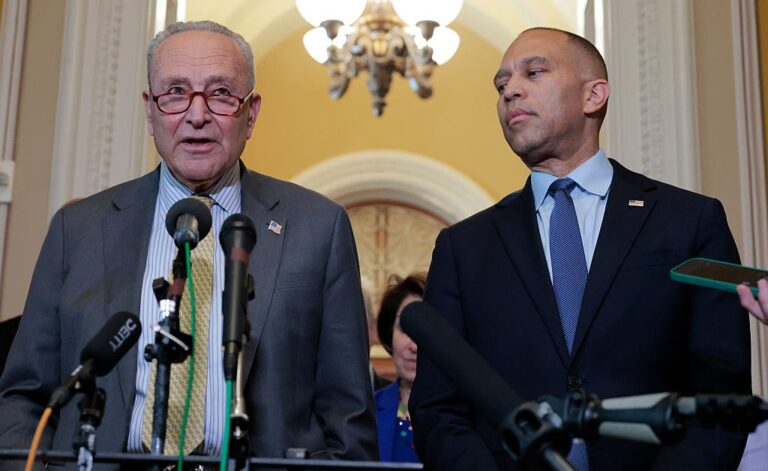With just over 24 hours before the government is set to shut down, President Donald Trump and congressional leaders from both parties emerged from a high-stakes White House meeting on Monday with no agreement, setting the stage for large swaths of the federal government to close after midnight Wednesday.
The impasse came after closed-door talks between the four top congressional leaders and Trump in the Oval Office, where lawmakers appeared to trade blame but make little progress towards a deal. “There are still large differences between us,” Senate Minority Leader Chuck Schumer told reporters after the meeting, claiming that Republicans refused to engage on their core demands around health care and restoring previous funding cuts.
“Their bill has not one iota of Democratic input,” he added, taking aim at a House-passed seven-week stopgap funding bill that Senate Democrats rejected last week. “That is never how we’ve done this before.”
Republican leaders also cast doubt on the prospects for a deal and insisted that Democrats should support their measure to extend federal funding at current levels through Nov. 21 and provide $88 million in added security for top government officials. “I think we’re headed to a shutdown because the Democrats won’t do the right thing,” Vice President J.D. Vance told reporters.
The meeting, held just one day before the Sept. 30 funding deadline, marked Trump’s first with top Democratic leaders since his inauguration in January. It was also the first time Trump had ever met House Democratic Leader Hakeem Jeffries.
Democrats have continued to assert that their votes—which are needed to clear the Senate’s 60-vote threshold—are contingent on the bill including key health care provisions, particularly a permanent extension of enhanced Affordable Care Act (ACA) tax credits that have helped millions of middle-class families afford coverage. Without action, those subsidies will expire at year’s end, raising premiums just as Americans begin signing up for 2026 plans in November.
Democrats also want to reverse $1 trillion in cuts to Medicaid that Republicans enacted unilaterally this summer, eliminate new work requirements for that program, block the White House from clawing back funds previously approved by Congress, and restore funding for medical research. But they have focused their demands on the ACA subsidies.
Republicans argue that Democrats are making unreasonable demands on a stopgap bill that historically has served as a narrow, short-term bridge. They have ruled out the idea of agreeing to ACA talks as part of an agreement to avert a shutdown, though appeared to signal openness to discussing the issue later on.
“They had some ideas that I thought were reasonable, and they had some ideas that the President thought was reasonable,” Vance said Monday, insisting that Republican leaders would “love” to work with Democrats on health care policy in the future—but that those talks should happen only after the government is kept open and essential services are funded.
Senate Majority Leader John Thune agreed that Republicans were “willing to sit down and work with” Democrats on issues such as the ACA subsidies at a later time when there isn’t a shutdown looming. “This is a hijacking of the American people—and it’s the American people that are going to pay the price,” Thune said.
The deadlock leaves the government barreling toward its first shutdown in nearly seven years. If no agreement is reached, hundreds of thousands of federal employees will be furloughed starting early Wednesday morning, while others deemed essential—such as air traffic controllers, Border Patrol agents and military service members—will be required to work without pay. Unlike in past shutdowns, the Trump Administration has threatened not only temporary furloughs but permanent job cuts in agencies overseeing environmental regulation, agriculture, and labor.
Democrats have blasted the mass firing threat as intimidation, claiming that the Trump Administration had already been laying off federal workers and would do it anyway.
The clash over health care appears to be the most significant sticking point in the negotiations between Democrats and Republicans. Jeffries described explaining to Trump during the meeting “some of the consequences of what’s happening in health care,” noting that rural hospitals and clinics have been closing after the President signed his signature policy bill this summer. “I don’t know if he knew this before,” Jeffries said.
Speaking to reporters later on Monday at the Capitol, Schumer signaled that he thinks there was “a division or possible division” between the President and GOP leadership on health care. He also said that Trump acknowledged in the meeting that presidents usually get blamed for a shutdown. “He admitted it in the room,” Schumer said.
It’s unclear which side will budge first. But Democrats are still reeling from the fallout after a group of centrist Democrats helped pass the previous government funding measure in March without any major concessions. Many in the party’s progressive wing are calling on Senate Democrats to not fold again.
The impasse is the latest in a long line of fiscal confrontations between Trump and Democrats. During his first term, a showdown over border wall funding in late 2018 led to the longest government shutdown in U.S. history—34 days.
The Senate is expected to vote once more on Tuesday on the Republican stopgap measure, but the bill is almost certain to fall short of the 60 votes needed. Sen. John Fetterman of Pennsylvania was the lone Democrat to vote with a majority of Republicans in favor of the bill on Sept. 19, while Sens. Murkowski and Rand Paul of Kentucky were the only Republicans to vote against it.
Without another plan, the government is on track to close its doors for the first time since 2018, with both sides convinced they will not be the ones to pay the political price.
As he left the White House on Monday evening, Schumer sounded resigned to the prospect.
“Ultimately, he’s the decision maker,” Schumer said of Trump. “And if he will accept some of the things we asked, which we think the American people are for, on health care and on rescissions, he can avoid a shutdown.”








